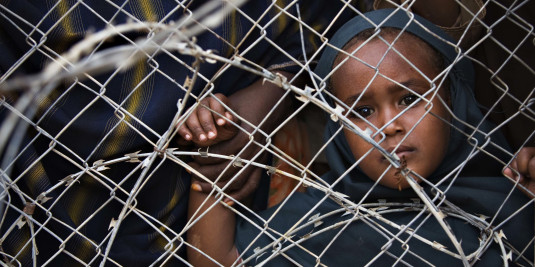
Photo Credit: Reuters
Migration and Transnational Flows
On any given day, federal agencies inspect about a million people entering the United States and 50,000 truck, rail, and sea containers. Trillions of dollars in wire transfers move through banks and financial institutions, and thousands of refugees cross international borders. Transnational flows such as these have long been an important element of the international system, creating both opportunities and risks for the U.S. and countries throughout the world.
CISAC scholars are actively engaged in seeking to understand the causes and effects of the movement of people, money, legal and illicit goods, and even ideas across boundaries and borders. Policy-oriented research can help decision-makers understanding the relationship between particular flows and distinct aspects of security. The study of migration in the context of security and international cooperation, for example, implicates not only terrorist mobility but also immigrant integration, identity management, border security, and the impact of migrant networks on development and public diplomacy.
CISAC Co-Director Mariano-Florentino Cuéllar has worked in both the policy and research arenas on the issue of transnational criminal networks. Among his projects is an examination of the interplay between great powers and non-state actors, and specifically the effect of U.S. policies on drug trafficking and cross-border violence. Cuéllar's policy and academic work has also focused on domestic and international migration as well as transnational financial flows.
Researchers also study the security dimensions of migration, refugees, and internally displaced persons, as well as the legal, moral, and ethical context in which policies regarding migration are developed. Such work includes Kelly M. Greenhill's analysis of the use of the threat of mass migration as a tool of war, and Alexander Betts' work on the governance of global migration, as well as his attempt to understand refugees within the context of international relations theory. Kenneth Schultz and Hein Goemans are researching the nature and origin of territorial disputes and the relationship between the way borders are drawn and international stability.
Publications
The 5 most recent are displayed. More publications »
- Exposure to Low-‐Dose Radiation: We Need Social Discussion for Risk Judgment
Toshihiro Higuchi
Asahi Shimbun (2012)

- Managing Insecurities Across the Pacific
Nina L. Hachigian
The Center for American Progress (2012)

 The Slave Trade and the Origins of International Human Rights Law
The Slave Trade and the Origins of International Human Rights Law
Jenny Martinez
Oxford University Press (2011)
 Hedy's Folly: The Life and Breakthrough Inventions of Hedy Lamarr, the Most Beautiful Woman in the World
Hedy's Folly: The Life and Breakthrough Inventions of Hedy Lamarr, the Most Beautiful Woman in the World
Richard Rhodes
Doubleday (2011)
- Deterring Strategic Cyberattack
David Elliott
IEEE Security & Privacy vol. 9, 5 (2011)

Events & Presentations
 Forecasting Drug Violence in Guatemala: An Application of a Probabilistic Tactical Warning Model
Forecasting Drug Violence in Guatemala: An Application of a Probabilistic Tactical Warning Model
June 7, 2012 Social Science Seminar
David Blum Determinants of Territorial Conflicts in Africa
Determinants of Territorial Conflicts in Africa
October 13, 2011 Social Science Seminar
Hein Goemans, Kenneth A. Schultz, Jessica Gottlieb "Presumed Guilty" and post-film discussion with the director
"Presumed Guilty" and post-film discussion with the director
October 7, 2011 Conversation
Mariano-Florentino Cuéllar, Beatriz Magaloni, Roberto Hernández flyer available
flyer available- Violence, Drugs and Governance: Mexican Security in Comparative Perspective
October 3, 2011 - October 4, 2011 CDDRL, CISAC, FSI Stanford Conference
Mariano-Florentino Cuéllar, Beatriz Magaloni 12 papers available
12 papers available  New Borders and Their Consequences
New Borders and Their Consequences
June 2, 2011 Research Seminar
Hein Goemans, Amanda Robinson paper available
paper available



 About CISAC
About CISAC
 Mailing List
Mailing List @StanfordCISAC
@StanfordCISAC Facebook
Facebook